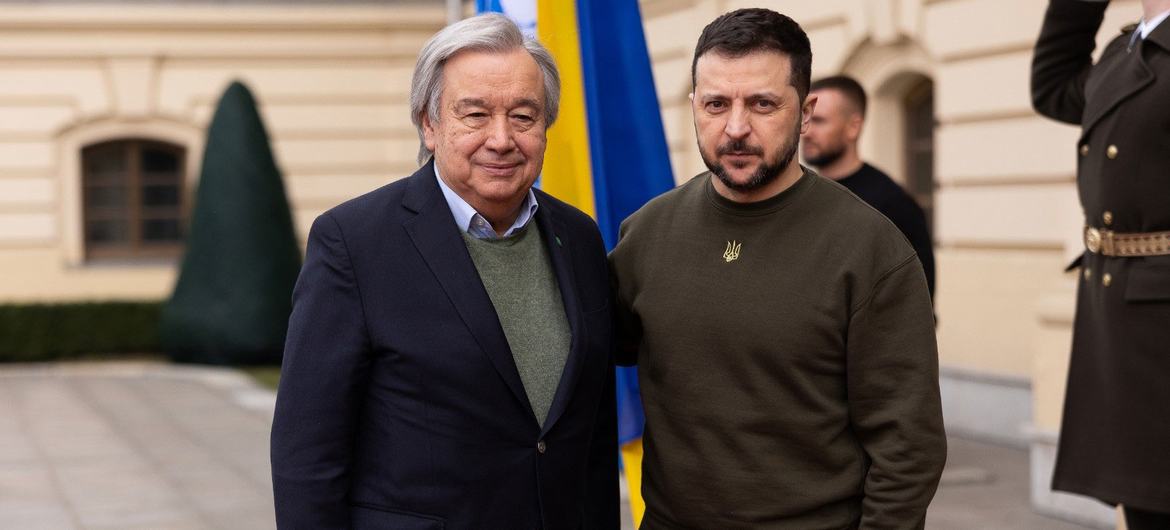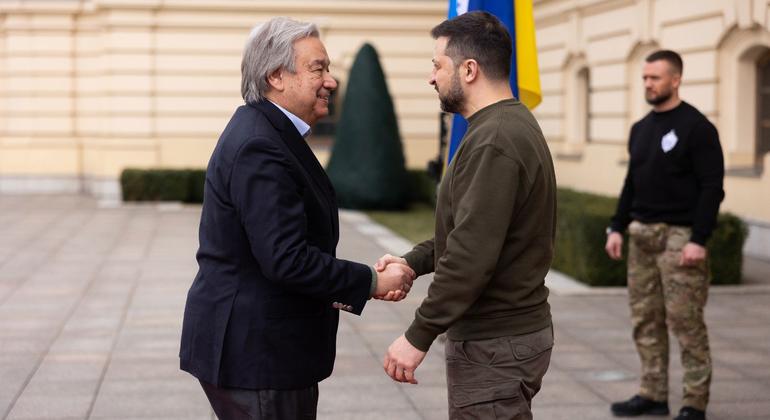António Guterres expressed “deep solidarity” with all of those who have become victims of the full-scale Russian invasion of February last year.
Violation of the Charter
“The position of the United Nations, which I have consistently expressed, is crystal clear: Russia’s invasion of Ukraine is a violation of the UN Charter and international law”, declared the UN chief.
He reiterated once again, that the sovereignty, independence, and integrity of Ukraine must be upheld within it’s recognized international borders, established at independence in 1991, following the dissolution of the Soviet Union.
Until a just peace can be attained, he said the UN would continue working hard to mitigate the impacts of a war “which has caused enormous suffering for the Ukrainian people – with profound global implications.”
The Secretary-General noted the UN had been on the ground throughout the invasion, delivering aid to millions.
“I want to express my deep solidarity with all the victims of the war. To those who have lost their lives and to their loved ones. To those who have seen their hopes dashed or had to flee in search of survival.
“They are all owed effective accountability” the UN chief said.
He ran through some of the key moments where the UN had engaged to help save lives and even avoid potential nuclear disaster, including the evacuation of civilians from the stricken Azovstal steel plant in the destroyed city of Mariupol last year.
The International Atomic Energy Agency, IAEA, has been “fully mobilized to try and preserve the safety and security of nuclear power plants in Ukraine, including in Zaporizhzhia”, the UN chief said.
23 million tonnes of grain
The Black Sea Grain Initiative, proposed by the Secretary-General and brought into operation following agreement between Russia, Ukraine, Türkiye and the UN last July, has already facilitated the export of 23 million tons of grain from Ukrainian ports.
The deal is due to expire in less than two weeks, after being extended last November, when a breakthrough was made on increasing the flow of Russian fertiliser which had been held up in European ports.
The deal, managed by a Joint Coordination Centre in Istanbul, has contributed to lowering the global cost of food and provided “critical relief to people, who are also paying a high price for this war, particularly in the developing world”, Mr. Guterres noted.
He reiterated that exports of Ukrainian, as well as Russian food and fertilizers, are essential to global food security and prices. He said it was critical for the initiative to continue beyond this month’s expiration.
On the Zaporizhzhia Nuclear Power Plant, Mr. Guterres said that it was important to facilitate mediation to seek the full demilitarization of the area, while ensuring that the plant goes back to normal operation: “The United Nations stands ready to offer its good offices.”

UN Secretary-General António Guterres (left) has visited Ukraine three times in less than a year.
Support for solutions
At the same time, he added, “we will continue to support solutions for humanitarian problems wherever possible on every front – such as a meaningful expansion of the current exchange of prisoners of war until it is completed.”
Recent images of a Ukrainian soldier apparently being summarily killed was a “shocking” and “tragic reminder that the laws of war must be strictly respected”, the UN chief added.
In the meeting with the Ukrainian premier, Mr. Guterres was accompanied by Rebeca Grynspan, the Secretary-General of UNCTAD, Martin Griffiths, the UN’s Emergency Relief Coordinator, and Denise Brown, the Resident and Humanitarian Coordinator in Ukraine.



